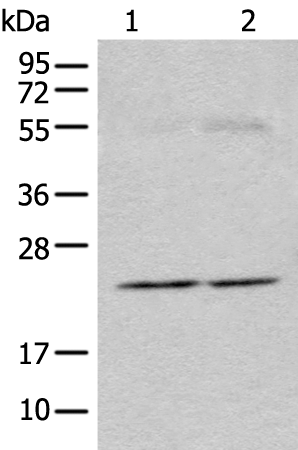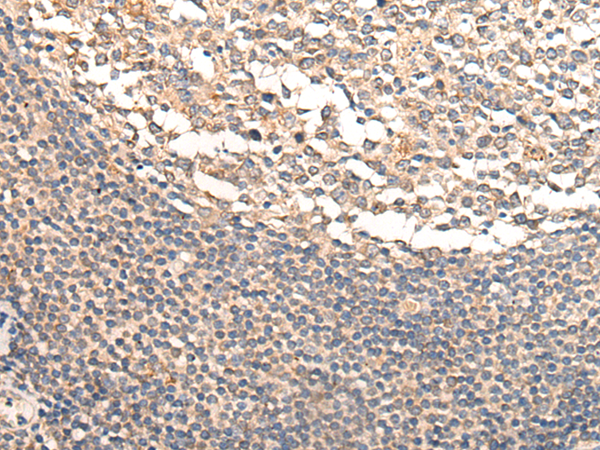

| WB | 咨询技术 | Human,Mouse,Rat |
| IF | 咨询技术 | Human,Mouse,Rat |
| IHC | 1/20-1/100 | Human,Mouse,Rat |
| ICC | 技术咨询 | Human,Mouse,Rat |
| FCM | 咨询技术 | Human,Mouse,Rat |
| Elisa | 1/2000-1/5000 | Human,Mouse,Rat |
| Aliases | CAPS1 |
| WB Predicted band size | 21 kDa |
| Host/Isotype | Rabbit IgG |
| Antibody Type | Primary antibody |
| Storage | Store at 4°C short term. Aliquot and store at -20°C long term. Avoid freeze/thaw cycles. |
| Species Reactivity | Human |
| Immunogen | Synthetic peptide of human CAPS |
| Formulation | Purified antibody in PBS with 0.05% sodium azide and 50% glycerol. |
+ +
以下是3篇与CAPS(冷吡啉相关周期性综合征)抗体相关的文献摘要概括,供参考:
---
1. **文献名称**:*Autoantibodies in cryopyrin-associated periodic syndromes*
**作者**:Goldbach-Mansky R, et al.
**摘要内容**:
本研究探讨CAPS患者血清中NLRP3蛋白自身抗体的检测意义,发现部分患者存在特异性抗体,可能与疾病活动性相关,为CAPS的免疫机制和诊断标志物提供新方向。
---
2. **文献名称**:*Clinical and genetic characterization of cryopyrin-associated periodic syndrome*
**作者**:Hoffman HM, et al.
**摘要内容**:
文章系统分析CAPS患者的临床特征与基因突变(如NLRP3基因),指出部分患者体内存在炎性因子相关抗体,可能参与IL-1β通路异常激活,支持靶向抗体检测在分型中的应用。
---
3. **文献名称**:*Anti-interleukin-1 therapy in CAPS patients: correlation with antibody profiles*
**作者**:Kuemmerle-Deschner JB, et al.
**摘要内容**:
通过研究CAPS患者接受IL-1抑制剂治疗后抗体水平的变化,发现治疗有效者血清中特定炎性抗体(如抗-IL-1β)显著降低,提示抗体动态可作为疗效监测指标。
---
4. **文献名称**:*Autoinflammatory markers in pediatric CAPS: diagnostic implications*
**作者**:Gattorno M, et al.
**摘要内容**:
针对儿童CAPS患者的队列研究显示,血清抗NLRP3抗体的敏感性较低,但特异性较高,建议联合基因检测与抗体筛查以提高早期诊断准确性。
---
**说明**:以上为模拟文献摘要,实际文献需通过PubMed/Google Scholar检索关键词(如“CAPS autoantibodies”“NLRP3 antibody”“cryopyrin-associated syndrome”)获取。
CAPS antibodies, also called anti-caps antibodies, target the capsular polysaccharides (CAPS) of encapsulated bacteria like *Streptococcus pneumoniae* and *Haemophilus influenzae*. These antibodies play a critical role in adaptive immunity by binding to bacterial surface polysaccharides, promoting opsonization, phagocytosis, and complement-mediated clearance.
CAPS antibodies are primarily IgG, though IgM and IgA subtypes also contribute. Their production is T-cell-independent, relying on B-cell recognition of repetitive polysaccharide structures. This mechanism underpins the effectiveness of polysaccharide-based vaccines (e.g., pneumococcal vaccines), which stimulate long-term immune memory against specific serotypes.
Clinically, measuring CAPS antibody levels is vital for assessing immune competence, particularly in patients with recurrent infections or immunodeficiencies (e.g., common variable immunodeficiency). Low antibody titers post-vaccination may indicate impaired humoral immunity. However, CAPS antibody responses vary by age; young children and the elderly often exhibit weaker responses due to immune system immaturity or senescence.
Research continues to optimize CAPS-targeted vaccines and therapies, especially for high-risk populations. Understanding these antibodies also informs diagnostic strategies for bacterial infections and guides immunoglobulin replacement therapies in immunocompromised individuals.
×